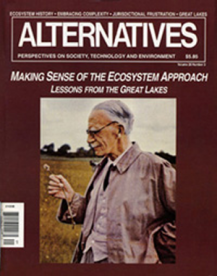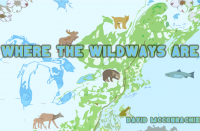This article is part of A\J’s web series Night School. In celebration of back-to-school time and our Night issue, the A\J web team brought you a series of quick lessons, posted between September 16 to October 11, 2013, covering everything from activism tactics and canning tips to how factory farms breed disease.
This article is part of A\J’s web series Night School. In celebration of back-to-school time and our Night issue, the A\J web team brought you a series of quick lessons, posted between September 16 to October 11, 2013, covering everything from activism tactics and canning tips to how factory farms breed disease.
A\J has always held a pretty wide definition of “environmental,” recognizing the interconnectedness of ecological, social, economic, cultural and political interests. This week in A\J History class, we look at our coverage of a concept that shares this sense of interconnectedness: ecosystem ecology (we also reveal our best-selling issues in a bonus lesson at the end).
 In a 1994 issue dedicated to the topic, Stephen Bocking defines ecosystem ecology as “a comprehensive, holistic, integrated approach” to “the study of living species and their physical environment as an integrated whole.” Bocking recounts an extensive history of the concept, starting with its inception in 1935 by British ecologist Arthur Tansley (featured on the cover; you can download the articles below).
In a 1994 issue dedicated to the topic, Stephen Bocking defines ecosystem ecology as “a comprehensive, holistic, integrated approach” to “the study of living species and their physical environment as an integrated whole.” Bocking recounts an extensive history of the concept, starting with its inception in 1935 by British ecologist Arthur Tansley (featured on the cover; you can download the articles below).
Detailing the “contradictory objectives” of protection and control to which ecosystems ecology (and ecology in general) has been put to use over the years, Bocking emphasizes that the lens through which we view and interpret nature both shapes and is shaped by “the concerns and priorities of society.” This continues to resonate strongly today, given the threat of climate change and the political nature of Canada’s response – or lack thereof.
Bocking explains that (up until the 1990s, at least), “most Canadian ecological research has been tied more or less closely to immediate resource management concerns” – fisheries, for example. The establishment of the Experimental Lakes Area has been a notable exception. The significance of the ELA’s long-term, whole-ecosystem approach is explained in our interview with David Schindler from 2012, and its defunding by the federal government is arguably emblematic of the lens through which the current government prefers to view nature.
Bocking goes on to lament a turn away from ecosystems ecology starting in the early 1970s in pursuit of easier answers, but A\J has continued to provide space for ecosystems thinking and other equally nuanced approaches. In what then-editor and current Editorial Board chair Bob Gibson named as A\J’s “most influential” article, James Kay and Eric Schneider argue against over-simplified, managerial approaches to nature in favour of “Embracing Complexity.” Kay and Schneider said it better than I can summarize:
If we are going to deal successfully with our biosphere, we are going to have to change how we do science and management. We will have to learn that we don’t manage ecosystems, we manage our interaction with them. Furthermore, the search for simple rules of ecosystem behaviour is futile.
Ecosystem self-organization unfolds like a symphony. Our challenge is to understand the rules of composition and the limitations and directions they place on the organization process…. However we should not expect to a have a science of ecology which allows us to predict the next note.
In 2008’s “Thinking Like an Ecosystem,” Chris McLaughlin again calls for a move away from “our business-as-usual approach to natural resources management,” with a quirky but effective Humpty Dumpty metaphor and an homage to Aldo Leopold’s Thinking Like a Mountain. Resiliency is the key word this time, promoted as the best approach to dealing with the inevitable uncertainties of nature.
One year later, an issue on The New Ecology featured Thomas Homer-Dixon arguing that ecology will be the “master science” of the 21st century, and Stephen Bocking back again, arguing that, in the current political climate, no field of science will lead society. “Science can inform,” he writes, but “it cannot lead, and the essential environmental questions are political, not scientific.” He also warns that “ecology can also oppress when science is allowed to displace other forms of knowledge and experience,” such as local or Indigenous knowledge.
While these and other articles in The New Ecology show that many ecologists have, in fact, embraced complexity, it’s also clear that isn’t enough: we need everyone else to do so as well. I encourage you to check out the articles for more insight and solutions.
Read the articles:
- From the 1994 Making Sense of the Ecosystem Approach issue (in one PDF):
- The End of the World as We Know It, Bob Gibson’s editorial
- Visions of Nature and Society: A History of the Ecosystem Concept, by Stephen Bocking
- Embracing Complexity: The Challenge of the Ecosystem Approach, by James J. Kay and Eric Schneider
- Thinking Like an Ecosystem, by Chris McLaughlin
- The Newest Science, by Thomas Homer-Dixon
- Leopold’s Challenge, by Stephen Bocking
Buy these issues for even more on ecosystems:
- Making Sense of the Ecosystem Approach 20.3
- Sustainability Taken Seriously 34.4
- The New Ecology 35.4
- Building Resilience 36.2 (a best-selling issue!)
You can get any of these issues or our best-sellers below for just $4 each (regular $6) using the coupon “nightschool4” at checkout.
Bonus lesson: A\J best-sellers!
 I was surprised to find out that our best-selling issue on newsstands was Out of the Box from January 2008. It’s not a particularly eye-catching cover – until you see the last headline in the list: “Harry Potter and Death.” Apparently we’ve got a lot of Harry Potter fans out there.
I was surprised to find out that our best-selling issue on newsstands was Out of the Box from January 2008. It’s not a particularly eye-catching cover – until you see the last headline in the list: “Harry Potter and Death.” Apparently we’ve got a lot of Harry Potter fans out there.
Runners up included Building Resilience from March 2010, EcoBooks from May 2011 (featuring a naked David Suzuki; no surprise there), and our November 2011 40th Anniversary issue, a favourite of Bob Gibson’s. Founder Bob Paehlke’s favourite issue? The hard-hitting In Defence of Science, featuring what he named our all-time best headline – “Schindler’s Pissed.“
Laura is a past A\J managing editor. She has an MA in Communication Studies from Wilfrid Laurier University, is an organizing aficionado, lackadaisical gardener, and former musical theatre producer. @inhabitings













